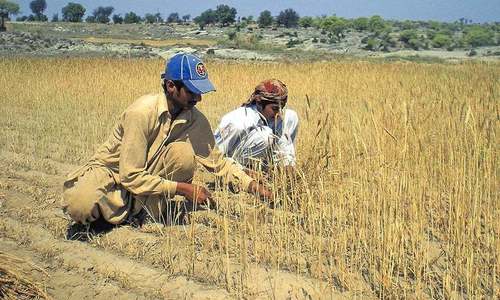ISLAMABAD: Minister for National Food Security and Research Syed Fakhar Imam on Saturday announced that a ‘national agriculture commission’ would be set up for the promotion of agricultural education and research.
Presiding over a meeting at the University of Agriculture Faisalabad (UAF), Mr Imam said that no nation could achieve development without investing in human resources, and Pakistan would need to learn from the experiences of other nations which had progressed in the agriculture sector.
The minister said that spending on research and development in the country remained at a low level from 1991 to 2012. This has impacted the per hectare production of major crops like wheat, rice, sugarcane, cotton and maize.
Citing examples of countries, Mr Imam said Pakistan had been ahead of China and South Korea five decades ago, but now it was lagging far behind. Stating that both the countries invested in education and learned from other nations’ experiences, he called for reforms in curriculum in the agriculture and reverse engineering.
Says spending on research and development remained low between 1991 and 2012
He said that the agriculture sector had been neglected for the last 25 years which was a matter of serious concern. “Agriculture is a powerful sector that is employing 43 per cent of workforce. Our neighboring countries are progressing at a faster pace whereas we are lagging far behind in modern agriculture practices,” he regretted.
The minister said the modern seed technology would not only reduce the cost of production but also make the crop profitable. “This will enable both the farmers and the country to march towards prosperity.”
He said that that increment in per acre production, value addition, empowering small farmers, tangible research in agriculture and rural development were prerequisites for the uplift of the country as well as food security.
Mr Imam disclosed that the government had mapped out comprehensive separate policies for five major crops in order to boost per acre productivity, ensure food security and agriculture development. This year, he said, per acre wheat production had improved which remained stagnant for the past 10 years. The improvement resulted in significant increase of 2.2 million tonnes in the national wheat production, showing the hike by 1.5 tonnes per acre, he added.
He said the cotton production in Punjab was touching 4.5m bales at an increase of about 8.5pc from the previous year. Overall cotton production is likely to reach 8.46m bales this year.
The minister said that the provision of certified seed, value addition and mechanisation were major challenges in which agriculture experts should have to play a pivotal role.
He said that the country was producing excellent fruits but their export was negligible. Value addition and the adaptation of international standard are prerequisites to gain markets and earn foreign exchange.
Mr Imam said it was a matter of grave concern that Pakistan imported edible oil and pulses worth billions of rupees instead of producing these commodities in the country.
UAF Vice Chancellor Prof Dr Iqrar Ahmad Khan suggested that FSc in agriculture should be revived that would help produce dedicated agriculturists. Agriculture as a subject must also be revived at the school level. He said the blend of corn and wheat be introduced to cope with increasing malnutrition issue.
Pro-Vice Chancellor Prof Dr Anas Sarwar said that a quality milk producing center must be set up, adding that the country was importing vaccination for livestock worth billions of rupees.
Published in Dawn, September 12th, 2021













































